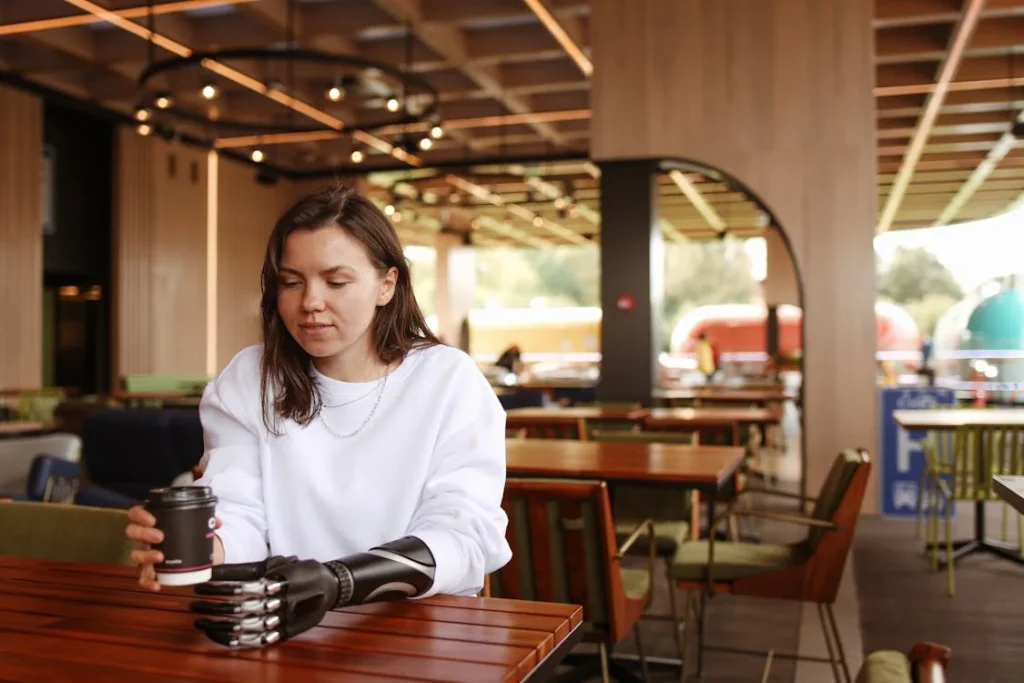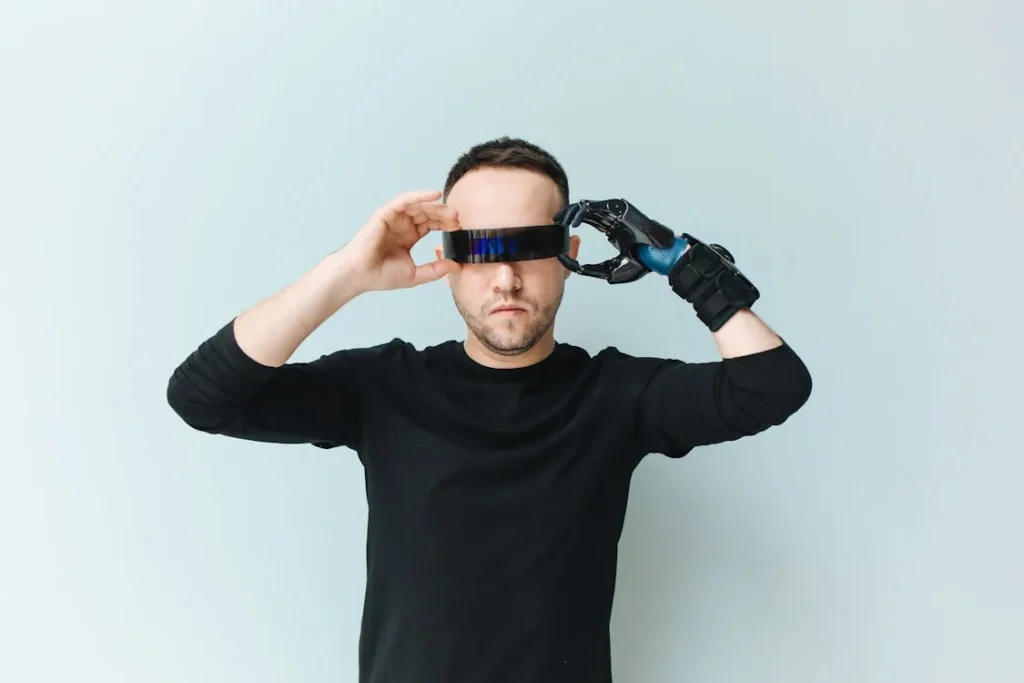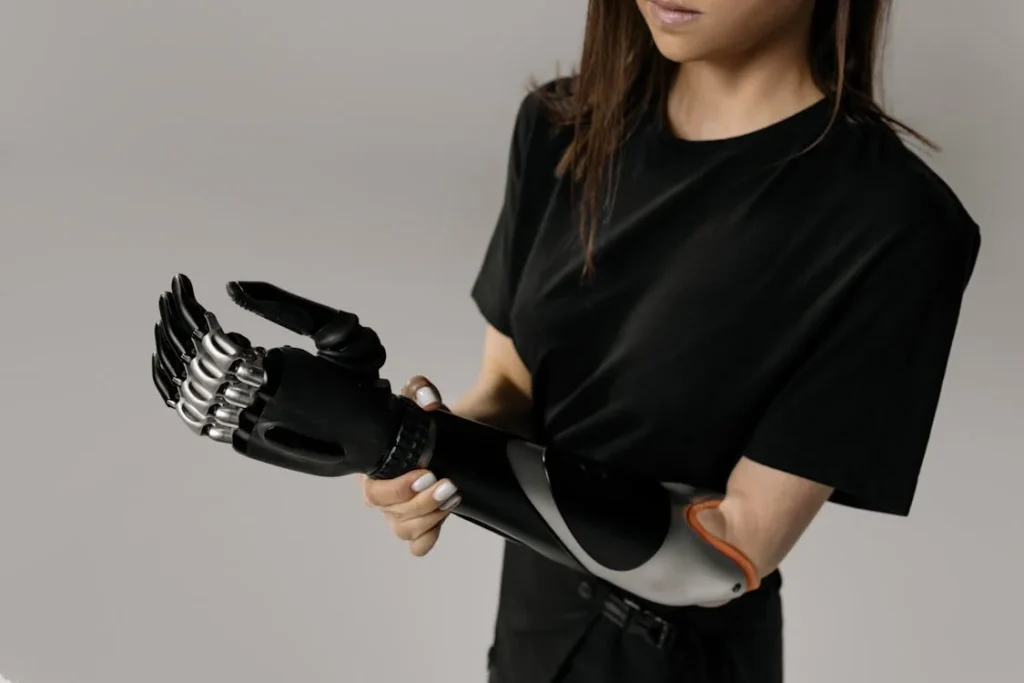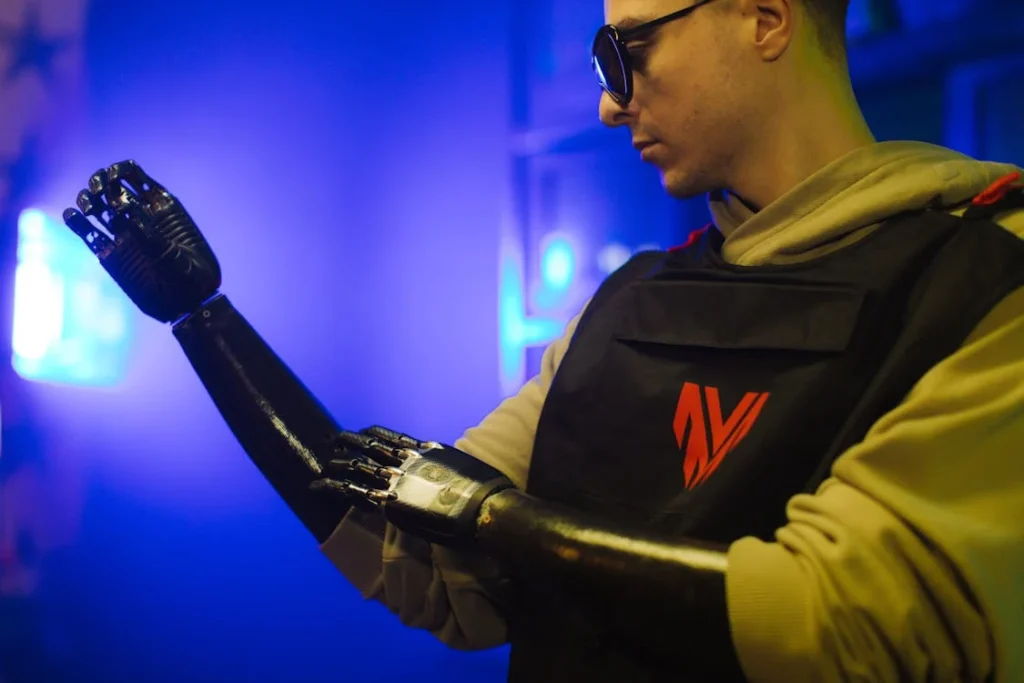When someone loses a hand or an arm, life changes instantly. Every second counts. The sooner they get a prosthetic, the sooner they can heal, move, and regain control. Early fitment isn’t just about speed. It’s about giving someone their life back—before they lose confidence, before their muscles weaken, before their hope fades.
But in India, the cost of prosthetics can feel heavy. Many families pause treatment not because they want to—but because they have to. They wait for money, paperwork, or some kind of miracle.
The good news? That miracle exists—and it’s built into our system. India has growing support through insurance plans, government schemes, and startup-led programs that make early fitment possible and practical. You just need to know where to look, what to ask, and how to act fast.

Why Early Fitment Matters More Than You Think
The First 90 Days Can Shape Everything
When a person loses a limb, the first few weeks after surgery or trauma are critical. Not just for the body—but for the mind, too. Muscles begin to shrink. Skin becomes sensitive. The brain starts re-mapping itself. If a prosthetic isn’t fitted soon enough, these changes can make adaptation harder. Delays in fitment can lead to long-term challenges—both physical and emotional.
That’s why early fitment is no longer seen as a luxury. It’s a medical priority.
In these first 90 days, the body is healing, yes. But it’s also ready. The arm is still flexible. The muscles still remember movement. The skin hasn’t fully toughened or scarred over. It’s the ideal window to begin training with a prosthetic. The person can learn faster, move better, and regain independence much more smoothly.
But there’s another side to early fitment that often gets missed: emotional recovery. Losing a limb can deeply affect self-image. People may feel isolated, dependent, even invisible. When you fit a prosthetic early, it’s not just about movement—it’s about momentum. It tells the person, “You’re not broken. You’re ready. Let’s begin again.”
This psychological lift can make all the difference. People who receive early prosthetics often return to work or school sooner. They engage more with family. They recover confidence before fear sets in. And they start building a new normal—on their terms.
At RoboBionics, we’ve seen this firsthand. Users who receive Grippy™ within weeks of amputation tend to use it more naturally. They learn faster. They trust the hand. And most importantly, they reconnect with their life sooner. That’s why we push so hard for early fitment. We don’t just want to restore hands—we want to restore hope.
The Financial Roadblock—and How Policy Can Clear It
Still, there’s a problem. Even when early fitment is medically and emotionally ideal, the cost can hold people back. A high-quality prosthetic hand like Grippy™ costs between ₹2.15–3 lakh. That’s far more affordable than imported options, which often cross ₹10 lakh. But for many Indian families, even this local cost can feel out of reach—especially on short notice.
People end up waiting. They delay. They “make do” until they can gather the money. By then, the early window is gone. Muscles weaken. Habits form. The learning curve gets steeper.
But what if you didn’t have to wait?
That’s where insurance and government support come in. In recent years, India has taken big steps to include prosthetics under health coverage and welfare schemes. Early fitment is now seen not just as a personal decision—but as a healthcare right.
The central government, state bodies, insurance regulators, and even private employers are creating new ways to fund early prosthetic care. And many people don’t even know they qualify. That’s the gap we want to close—with information, access, and the right partnerships.
Because when someone is ready to rebuild their life, money shouldn’t be what stops them.

Understanding India’s Government Support for Early Prosthetic Fitment
Where Policy Meets People
In India, the government has quietly built a framework to support people with limb loss. While the system may not always be fast or flashy, it’s growing—and it works. Several national and state-level programs help people access prosthetics early, often at little or no cost. The challenge is usually awareness. Many don’t know what’s available, or how to apply. That’s why knowing your options can make all the difference.
One of the biggest support systems in India is the Assistance to Disabled Persons for Purchase/Fitting of Aids and Appliances (ADIP) Scheme.
Run by the Ministry of Social Justice and Empowerment, this program provides free or heavily subsidised assistive devices—including prosthetic limbs—for eligible persons with disabilities. The key here is documentation. If you have a valid disability certificate and meet the income criteria, you can qualify for assistance quickly.
Under ADIP, the government partners with NGOs, hospitals, and prosthetic centres to hold fitment camps across the country. These camps don’t just offer devices—they offer early hope. People who might never have thought a bionic hand was possible walk out of these events with a new tool and a new sense of identity.
Some states take this further. For example, Maharashtra, Tamil Nadu, and Kerala have separate disability welfare departments that support early fitment through local grants, healthcare funds, or tie-ups with public hospitals. These programs vary—but they’re united by a simple idea: people should not have to wait to start living again.
In some cities, municipal corporations and district collectors release specific funds for urgent cases. These might cover the cost of early prosthetics, especially for students, workers, or accident survivors. The best way to access these benefits? Visit your nearest civil hospital or district disability welfare office. These places often have direct links with the funding channels—and can fast-track your application if your case is urgent.
Even educational institutions and employers sometimes offer fitment support. If a student loses a limb and needs a prosthetic to return to school, many public schools and colleges help file for government aid. Some even offer their own support through internal funds or CSR initiatives. Government jobs and state-run organizations may also cover prosthetic costs through employee healthcare.
This isn’t charity. It’s policy. And it’s built on the belief that early recovery is a public good.
RoboBionics: A Bridge to the Right Support
At RoboBionics, we don’t just build the Grippy™ hand. We also guide users through the support maze. We help them find the schemes they qualify for. We assist with paperwork. We connect them to trusted NGOs and state nodal officers. Because we know that information is as important as innovation.
If you’re eligible for ADIP or any government scheme, we’ll tell you exactly what to do. If you’re not sure where to start, we’ll walk with you. If you need help talking to local officials or getting your disability certificate, we’ve got your back. Because we don’t believe cost should delay confidence.
This is how early fitment becomes not just possible—but probable.

How Insurance is Catching Up With Real Needs
A Quiet Shift in Coverage
Until recently, prosthetics were often left out of insurance plans in India. Even if your surgery or hospitalization was covered, the limb you lost wasn’t. It was seen as an “external aid,” not a part of your treatment. That meant many families were left to cover the cost of prosthetics completely on their own, just when they were already facing emotional and financial strain.
But this is changing.
Today, more and more insurance policies—especially those linked to accidents and employer health plans—are beginning to cover prosthetic fitment. Some even include early fitment within post-operative care, recognizing it as part of recovery. While it’s not yet universal, the direction is clear: prosthetics are being seen as necessary healthcare, not optional extras.
For example, if someone loses a limb in a road accident, and the case is covered under a personal accident insurance policy, many insurers now allow claims for prosthetic limbs.
Some policies cap the reimbursement at ₹50,000 or ₹1 lakh, while others base it on the sum insured. But the key is, this can be claimed. You just need the right paperwork—surgical reports, prosthetic prescription, device invoice—and sometimes a follow-up note from a rehabilitation specialist.
Group health insurance offered by employers is another growing area. Several companies now offer plans where employees who suffer limb loss due to work-related or non-work incidents can claim for early prosthetic fitment. In some cases, HR teams even fast-track prosthetic support through partnerships with healthcare providers or prosthetic companies.
Government insurance schemes are also making progress. Ayushman Bharat – Pradhan Mantri Jan Arogya Yojana (PM-JAY) covers over 50 crore people in India.
While it traditionally focused on hospital care, there is now growing pressure to include rehabilitation and assistive devices like prosthetics. In some states, pilot projects under PM-JAY already offer partial or full reimbursement for basic prosthetic devices—especially in post-trauma recovery packages.
Other programs like the Employee State Insurance Scheme (ESIC) support workers in the organized sector. If a worker insured under ESIC loses a limb due to a work injury, they may be eligible not just for a prosthetic, but for full rehabilitation coverage—including physiotherapy and device maintenance.
This matters because insurance changes the timeline. If you know the cost will be covered—even partly—you’re far more likely to act quickly. You won’t delay. You’ll get fitted early, train early, and recover faster.
That’s how insurance fuels early fitment—not just through money, but through momentum.
RoboBionics Helps You Claim What’s Yours
Navigating insurance can be confusing. There are forms, codes, calls, and lots of waiting. At RoboBionics, we simplify this. We work directly with users to understand what coverage they already have—whether it’s a corporate plan, a state health card, or a private accident policy. Then we help them file, follow up, and fight for what they’re owed.
We’ve built templates for insurance letters. We know what words to use, what documents to send, and what red flags to avoid. We also guide users on how to talk to their insurer—what to ask, when to push, and how to keep records that matter.
We even support families in getting doctor recommendations and quotes in the right format. Because every day saved in paperwork is a day gained in recovery.
You don’t need to do this alone. We’ll help you get the coverage, get the hand, and get your life back on track—fast.

CSR and NGO Partnerships: The Unsung Heroes of Early Fitment
When Companies Step In to Change Lives
In India, Corporate Social Responsibility (CSR) isn’t just a checkbox—it’s a growing force for social good. Under Section 135 of the Companies Act, many firms are required to spend a portion of their profits on public welfare. And increasingly, they’re choosing healthcare—and more specifically, assistive technology like prosthetics—as a focus area.
This is creating new possibilities for early fitment.
At RoboBionics, we’ve had the privilege of working with companies that fund full or partial fitment of Grippy™ hands for people in need. Some fund cases directly through CSR donations. Others partner with NGOs, hospitals, or district authorities to reach the right beneficiaries. The goal is simple: to help someone regain their independence before time and trauma take a deeper toll.
The beauty of CSR support is how fast it can move. Once a case is approved, companies can fund fitment within days. No waiting for long-term government processes. No lengthy insurance back-and-forth. Just clear, committed action. And that speed makes early fitment possible in situations where every week matters.
CSR-driven early fitment is especially powerful for children, students, and workers—people who need to get back to daily life quickly. We’ve seen teenagers return to school within weeks of getting their Grippy™ hand, thanks to CSR support. We’ve seen young workers start earning again, confident and proud, not paused by paperwork.
These stories show that when business meets compassion, the impact is immediate and lasting.
NGOs That Do More Than Just Help
Non-profits across India are also stepping up to make early prosthetic fitment a reality. From rural outreach to urban rehab centers, these organizations are often the first point of contact for someone in need.
They spread awareness. They identify cases early. They connect people to funding sources. And in many cases, they cover the gap—whether it’s through direct donation, crowdfunding, or partnerships with device makers like us.
What sets the best NGOs apart is their understanding of urgency. They don’t wait. They don’t let someone sit for six months while muscle tone drops and motivation fades. They act fast. They arrange assessments, gather documents, talk to district officers, and make things happen.
Some even run permanent centers where early assessment and fitment can happen on-site. Others conduct mobile camps—bringing tech like Grippy™ to remote areas, where people have never seen a bionic hand, let alone worn one. And when someone’s ready, they don’t just give them a device—they give them dignity.
At RoboBionics, we proudly collaborate with NGOs that share our values. We offer demo sessions, training support, and discounted pricing for social cases. Because we believe innovation should meet inclusion—not sit behind glass, waiting for the wealthy.
Together with NGOs and CSR teams, we’re helping rewrite the story of early fitment in India—from a distant dream to a practical, present-day solution.

Digital First: How Technology Is Speeding Up Early Fitment
From Hospital Queues to Home Screens
One of the biggest challenges with early prosthetic fitment in India is access—not just to funding, but to guidance. After surgery or trauma, most people don’t know where to go, who to ask, or what to expect. They rely on word of mouth, distant clinics, and overcrowded hospitals. The result? Weeks or months of waiting, when action should’ve started within days.
But digital tools are changing that—fast.
Today, a family in a Tier 2 or Tier 3 town doesn’t have to travel for hours to find prosthetic options. With a few taps, they can attend a live demo online, talk to our team at RoboBionics, and understand what a bionic hand like Grippy™ can do. They can share medical reports, get pre-assessments, and even start basic training—all from home.
This shift from physical to digital makes early fitment more accessible, more informed, and far less stressful. It removes geography from the equation. It cuts down time, cost, and confusion. And most importantly, it empowers users and their families to act now, instead of waiting for the “right time.”
Gamified Rehab That Starts Day One
Training is a huge part of using a bionic hand effectively—especially when the goal is early fitment. But rehab often gets delayed. Clinics are far. Schedules are tight. The exercises feel dull. And soon, people lose motivation.
That’s why we created our Gamified Rehabilitation App.
It lets users begin muscle training and gesture control even before they receive the prosthetic. This builds confidence. It keeps the brain connected to the idea of movement. It prepares the body. And once the hand is fitted, learning speeds up because the groundwork is already done.
Through fun tasks and friendly challenges, the app helps users improve muscle signals, learn grip control, and track their progress. This playful, digital rehab method reduces the emotional load of recovery. It makes healing feel exciting—not exhausting.
It also supports early fitment by showing doctors and insurers that the user is committed and ready. That readiness can often tip the balance in funding decisions or therapy approvals.
Tele-Consultation: Experts Within Reach
Another powerful digital tool in early fitment is tele-rehabilitation. At RoboBionics, we offer video sessions where users can meet our experts without leaving their home. These sessions cover everything—from stump condition checks to grip testing and device education.
Through screen-sharing and guided tests, our therapists and engineers assess whether someone is ready for fitting, what type of device will suit them, and what steps to take next. This saves time, prevents travel fatigue, and makes prosthetic care feel personal, not procedural.
In areas where prosthetic experts are rare, tele-consultation becomes a lifeline. It ensures early decisions, early training, and early results.
Together, digital tools are making early fitment faster, smarter, and more human. They bring care to where the user is—not the other way around. And they prove that in the world of prosthetics, technology isn’t just about the device—it’s about the journey.

The Local Voice: Why Community Awareness Drives Early Access
Information Gaps Are the Real Barrier
In many parts of India, especially in rural areas, it’s not just cost or distance that delays prosthetic fitment—it’s silence. Most people simply don’t know that early intervention exists. They don’t know a bionic hand can be fitted within weeks. They don’t know support is available. They assume they must live without, wait for years, or rely on outdated wooden limbs.
This lack of awareness is one of the biggest barriers to early recovery.
And that’s where local champions come in.
From community health workers to district disability officers, village heads to school teachers—these local voices often become the first touchpoint for someone who’s just experienced limb loss. They see the need early. They can step in. And when they have the right information, they can guide families toward action before it’s too late.
The Power of Word-of-Mouth
At RoboBionics, some of our most successful early fitments have started with a simple conversation—a bus conductor who told a co-worker about Grippy™, a teacher who saw one of our videos and referred a student, a local NGO volunteer who recognized early symptoms and made a call.
Word-of-mouth works. Especially in tight-knit communities, one story of success can ripple across dozens of homes. A farmer gets a hand, returns to work, and suddenly the whole village wants to know how. That curiosity drives demand. And that demand leads to faster action.
This is why we invest in awareness—not just with ads, but with people. We train our partner clinics to conduct community talks. We support health camps with demos. We create local-language videos that show what’s possible. Because we believe information is the first step toward independence.
Cultural Sensitivity Matters
Another layer in early fitment is culture. In some communities, disability is still seen as something to be hidden. There’s stigma, silence, and sometimes even shame. People don’t talk about their needs. They avoid hospitals. They wait for problems to “settle.”
This makes early fitment difficult—unless the message is delivered with understanding.
We’ve seen that when community leaders or local influencers speak up in familiar language and tone, the resistance melts. People open up. They ask questions. They attend demos. That trust opens the door for real care.
That’s why we work closely with local leaders and language experts. We train field teams to listen more than they speak. And we build trust before we talk about tech. Because only when someone feels seen can they begin to heal.
Community awareness is not flashy. It doesn’t involve machines or money. But it changes lives.
One person who knows the right information can lead ten more toward early fitment. One demo in a school can reshape how a whole district sees limb difference. One loud, proud user can inspire a quiet neighbor to step forward.
And when that happens, early fitment is no longer a privilege. It becomes a right—backed not just by policy, but by people.
Conclusion
When someone loses a limb, every day without support can deepen the wound—physically, emotionally, financially. But early prosthetic fitment can change everything. It rebuilds strength, restores confidence, and gives people the freedom to move forward faster.
In India, support is growing—from government programs, insurance, CSR efforts, and digital tools. But the real change begins with awareness. Knowing what’s possible. Acting without delay. And asking for the help you deserve.
At RoboBionics, we believe that technology is only part of the solution. The rest is care, clarity, and commitment. And we’re here to walk with you through every step—from paperwork to prosthetic, from confusion to confidence.
👉 Book a free demo today and take your first step toward recovery. Because every hand fitted early is a life rebuilt fully.



